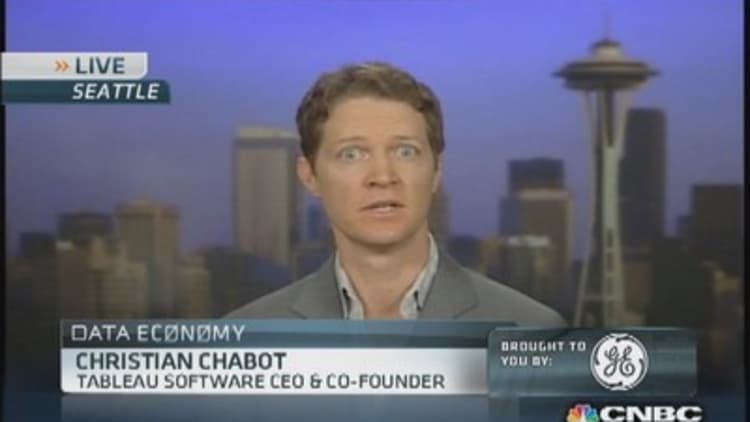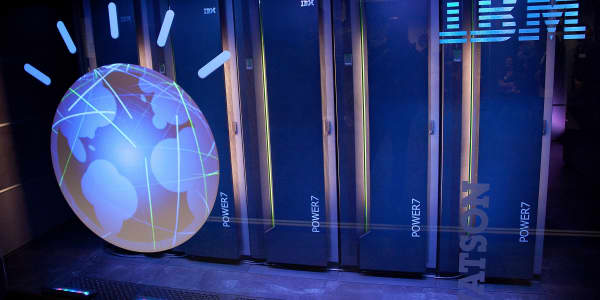Twitter's under-reported line item
The market's can't get enough of the pending Twitter IPO. Nothing like the valuation of a Silicon Valley giant that still loses money to get investors salivating.
But there's one aspect of Twitter's financials that was recently revealed in its IPO filing that is an underanalyzed, and growing, money maker: sale of Twitter data to third parties. More than $47 million has come from selling off its data to a fast-growing group of companies that analyze the data for insights into news events and trends. That is a small amount compared with the revenue generated from advertising, but Twitter's data business has rippled across the economy, according to a report in The Wall Street Journal.
Apple is the next Dell?
From Hewlett-Packard to Dell, the death of the PC hasn't been greatly exaggerated at all. But one PC maker that has withstood the trend is Apple, with its shiny lineup of Macs. That may be changing. In the third quarter, Mac sales dropped 11 percent to 1.9 million from the period a year earlier, according to an IDC report. In the past, consumers would buy the iPhone or iPad, and Apple bet the consumers would get pulled into the entire ecosystem and begin buying MacBook Pros or MacBook Airs. But, that halo effect is fading, according to BGC Financial analyst Colin Gillis.
How to make some cool charts
Big data isn't just for big business, and you don't have to turn to big-data-for-the-masses company Tableau Software, either. No matter how big the data, you, yes even you, can find ways to make use of it. There are plenty of apps out there that will let you make some pretty cool visualizations of big data sets.TechRepublic profiled five of these apps.
(Read more: The Moneyball misplay: Sport's big error?)
Lady Gaga's data-based approach to hit-making
The digital world has done more than change the way music is delivered to fans. It has revolutionized how labels find new acts and position existing ones. While the days of scouts stumbling across the next big artist in a darkened bar are not completely gone, they're quickly being replaced by deep data mining. And agents and labels are increasingly leaning on social media to help guide a performer's career.
Now this can't be true
Buy orange cars. Don't expect the traffic jam to end where it actually should end. Don't get a connecting flight through Denver. A caption is worth a thousand words, and more than an image on Instagram. Sports fans are the most emotionally stable people in society? Yes. Data is uncovering some very strange findings and drawing us to some very bizarre conclusions.
(Read more: 10 surprising ways companies use your data)
It's over: You've got zero privacy
"Watching the legal system deal with the Internet is like watching somebody trying to drive a car by looking only in the rearview mirror. The results are amusing and predictable but not really interesting. On the other hand, watching the efforts of regulators—whether national ones such as Ofcom, or multinational, such as the European Commission—is more instructive," writes John Naughton in The Guardian. "At the moment, the commission is wrestling with the problem of how to protect the data of European citizens in a world dominated by Google, Facebook and co.," and Naughton doesn't like what he's seeing.

IBM can figure out your personality in 200 tweets
IBM Research has created the Accelerated Discovery Lab to find connections among massive sets of data. IBM is focused on the "four V's of data," or volume, velocity, variety and veracity, explained Laura Haas, IBM fellow and director of technology and operations at the lab, in an interview with VentureBeat.
One of Haas' research collaborators is responsible for a big data trick that can peg your personality in 200 tweets. Sure, drug discovery is one area in which you would expect big data to play a role, cutting down the cost and time involved in finding new treatments. But consider Thiess, an Australian mining company, which has partnered with IBM to increase its production rate, reduce operational downtime and cut maintenance costs.
(Read more: 10 strangest data finding you need to know)
How much big data really knows ... about you
We can—and do—debate on a daily basis whether big data is all hype or ultimate business game changer. But we spend less time figuring out exactly how much big data knows about us, personally, One New Republic writer set out to change that, at least when it came to himself. "The world of Big Data is a world of pervasive data collection and aggressive analytics. Some see the future and cheer it on; others rebel.
Behind it all lurks a question most of us are asking—does it really matter? I had a chance to find out recently, as I got to see what Acxiom, a large-scale commercial data aggregator, had collected about me," writes Paul Rosenzweig on the TNR website.
U.S. Post Office not as outdated as you think
The government may be shuttered, but the U.S. Postal Service remains on the cutting edge of technology. And you thought snail mail and its budget woes made the USPS a dinosaur. In fact, quite the opposite: the U.S. Postal Service's supercomputing and big data efforts are about to get a substantial upgrade, with a new five-year, $16.7 million contract awarded to Maryland-based FedCentric Technologies to expand the agency's supercomputing capabilities.
Currently, the USPS operates a supercomputer with 16 terabytes of in-memory computing, capable of scanning 528 million mail pieces per day against a database of 400 billion records in near real-time, according to a report in The Business of Federal Technology.
The next Jeff Bezos?
Domo, a Utah-based start-up for the sales and marketing profession that has raised $125 million from the likes of Salesforce.com CEO Marc Benioff and Jeff Bezos of Amazon is the next "big data" darling, right? Maybe, maybe not. Maybe it's something entirely new and different.
In an interview with VentureBeat, Domo CEO Josh James said that every single report about his company has been wrong. And James said he is way over big data.
"Everyone is watching us [as] we invented big data," he said flippantly. "Big data is nothing new—I've been dealing with over a trillion and a half transactions every quarter since 1996," he said. "Our premise is that we help customers make money. I don't care if it's big data, small data, visualizations—we're doing all of the above in ways you've never seen before."
James previously sold Omniture to Adobe for $1.8 billion.
—By Eric Rosenbaum, CNBC.com





